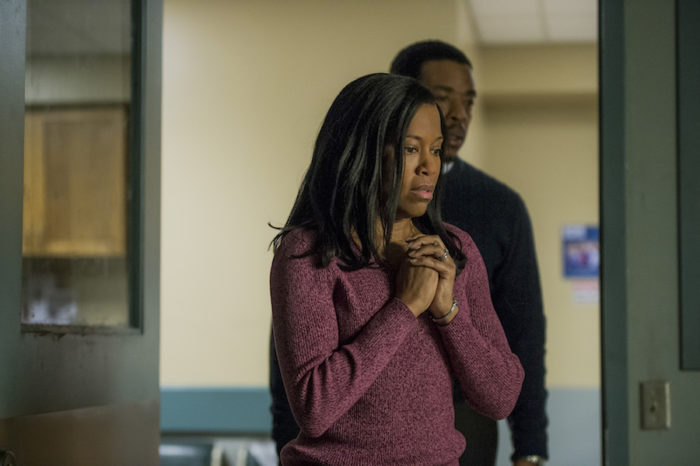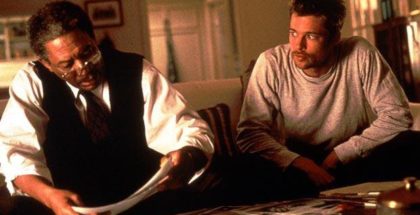Netflix UK TV review: Seven Seconds
Review Overview
Opening Statements
4Prosecution
9Closing Arguments
7Benedict Seal | On 02, Mar 2018
Seven Seconds is a powerfully relevant, if frustrating, 10-part American crime drama. A young cop, Peter Jablonski (Beau Knapp, picture a long-lost Jonas Brother), hits a black teenager, Brenton Butler, while driving across a snowy Jersey City park. In the panic, he calls his new unit, headed by Mike DiAngelo (David Lyons), and they encourage him to drive away and forget it ever happened. When the news reaches the victim’s family and the local media, social tensions flare up in violent ways.
This is no crime mystery, as all the key details of the case are presented in the opening 10 minutes. This reflects the series’ message that it matters less what happened and more how the American criminal justice system deals with incidents like this. This structure does, however, mean that any dead ends in the investigation, part and parcel of normal crime procedurals, just come across as diversions and distractions to the omniscient viewer. And it becomes frustrating watching the gin-swigging assistant prosecutor, KJ (Clare-Hope Ashitey), and the gum-chomping detective, Fish (Michael Mosley), very slowly come to the realisation that this might have something to do with fellow law enforcement officers.
This and other issues, including some unconvincing acting and writing, make the opening episodes a struggle. It takes a long while for any of these characters to feel real. Most of the actors do grow into their roles and begin to elevate the simplistic initial characterisations – particularly a moving Regina King as Brenton’s mother. But, early on, the plain archetypes are played very broadly – including the eye-rolling forced “grit” of macho men – albeit with strange character quirks ranging from the odd to the poetic. Characters that are introduced later on suffer far less because they join a story that’s well on the move rather than having to help get the thing started.
Elsewhere, there’s a strange lack of subplots. Unlike most Netflix dramas, the episodes all fall within a minute or two of an hour in length (the final episode being the outlier at 80 minutes). Early episodes, in particular, do little to justify such stringent timings. There’s not much going on beyond the focal case; KJ’s dangerous alcoholism is forgotten about, and her progression to upstanding lawyer doesn’t feel particularly natural as a result. Otherwise interesting side characters, meanwhile, flit in and out only when the A plot requires them. This makes even the best episodes quite dense.
The slow set-up does, however, lead to a run of fantastically effective episodes in the middle of the season. As KJ and Fish plan their approach to this fraught situation and tensions fray between Jablonski and DiAngelo, Seven Seconds channels some of the searing, street-level realist brilliance of The Wire.
Created by Veena Sud (the US remake of The Killing), Seven Seconds is based on a little-known 2013 Russian film, The Major. It may be an unusual source, but the drama seamlessly transposes over to East Coast America. The social commentary is fierce and relentless; Sud deals with issues including, but not limited to, institutional racism and sexism, police brutality, political corruption and a criminal health care system. Black Lives Matter is pitted against Blue Lives Matter as a raw and relatable backdrop to events.
This world is brought to life by a talented set of directors. Gavin O’Connor (The Accountant) brings a slice of Hollywood to the pilot, and Episode 2 tragically stands as the last work of the late and legendary Jonathan Demme. Visually, the showrunner instills some of her Scandi noir heritage. The snowy locales are striking and are well contrasted with the same locations shot after the scarlet snow has melted – a visual metaphor for a changing America that will never be able to shake its foundations. It’s also refreshing to see a new city given the screen treatment. With Manhattan visible across the river, but always just out of reach, Sud explores the streets of a city rarely seen on film, in a similar way to The Wire’s showcase of Baltimore.
The momentum of the impressive middle act, though, is slowed by the talky courtroom drama of the closing episodes. The writing and performances aren’t snappy enough to enliven this generic setting; the neutral interiors are shot very simplistically with few camera angles and none of the heightened aesthetics of, for example, The People v. O.J. Simpson: American Crime Story. Unlike that stellar series, there’s no time spent with the jury, so the emotional reach is once again limited to the principal cast. This causes the series’ final moments to regress to some of the monotony of the opening hours. Even in the exciting moments, there’s very little action, which contributes to the feeling that the show has just one mode for the most part. It’s painfully earnest, but when provided with little emotional relief, that can drift towards depressing coldness.
Seven Seconds does have some truly great episodes, but it’s a slog wading through four hours of second-rate urban melodrama to get there. Sud has created a fiery and important drama, but one that can’t possibly live up to its promise. She must still be admired, though, for taking on so much that the show ultimately spreads itself a bit too thin. It offers a broad spectrum of moving social consciousness but lacks an incisive cut to more specific issues. It’s not particularly subtle, but the anger is more than justified given the context in which it’s released. Seven Seconds poses tricky moral questions and is refreshingly, even daringly, critical of the current sociopolitical landscape. It’s a fitting series for a divided nation that’s very slowly coming to terms with its violent contradictions.
Seven Seconds is available on Netflix UK, as part of an £9.99 monthly subscription.



















